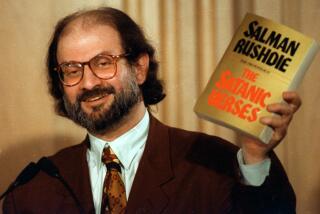Recovering What Was Lost : THE GREEN KNIGHT, <i> By Iris Murdoch (Viking: $23.95; 472 pp.)</i>
- Share via
One of the strangest and perhaps most inexplicable aspects of contemporary American literature is the seemingly inverse correlation between life and fiction: The more complex our everyday existence has become, the more spartan and minimal the literature of recent decades has appeared.
Not so with English novels. The Age of Minimalism seems hardly to have grazed the sensibility of fiction writers across the sea. Think of Michael Indaatje’s “The English Patient,” V. S. Naipaul’s “The Enigma of Arrival” or Marina Warner’s remarkable “Indigo.” These novels, laden with complexity and a richness of language, seem much more directly connected to the great literary works of the 19th Century.
The same can be said for Dame Irish Murdoch’s 25th work of fiction, “The Green Knight,” a vast moral and intellectual tour de force, set in contemporary London, that draws on myriad sources--Meister Ekhart, Beowulf, Hamlet, Goethe, Wittengenstein, biblical and Arthurian legends, to name a few--to create a work of deep philosophical, religious and ontological concerns.
In her previous novels--”The Sea, the Sea” and “The Nice and the Good” come to mind--Murdoch explored similar terrain. The moral underpinnings of human behavior and the extremes to which people will go to satisfy the most inchoate longings for justice and redemption are just some of her recurring themes.
In “The Green Knight,” Murdoch again stirs up the murky opposites of good and evil to set up the fundamental tension in her story, which is based on the biblical tale of Cain and Abel. Lucas Graffe, a middle-aged scholar and historian who has long harbored a resentment toward his half-brother Clement, attempts to murder him with a baseball bat in a park one night. Quite inadvertently a strangerby the name of Peter Mir turns up at the wrong moment and takes the blow instead.
It is assumed that Peter Mir is dead, and Lucas Graffe, brought to justice, is acquitted of murdering him after convincing a judge that he was only defending himself from a mugger. But Peter Mir is not dead. He effects a miraculous recovery--”just like Lazarus,” as someone in the novel says--and returns to confront his attacker, from whom he desires a strange form of retribution.
What Peter Mir most wants from Lucas Graffe in repayment for his attack is something quite unexpected. He wishes to be admitted into Lucas’s circle of family and friends. Peter is lonely; he wants a family and the sort of intimate relations he’s been denied thus far in life. He also wishes to regain some essential part of his consciousness he believes he lost when he suffered the blow on the head and which he feels only Lucas can help restore.
Lucas Graffe’s “family” includes an odd assortment of people to whom he is related less by blood than long-standing association. At the center of this group is a widow named Louise Anderson and her three “perfect” and beautiful teen-age daughters, as well as a homosexual couple, a religious seeker about to enter a monastery and several single women, all of whom are initially confused by Peter Mir’s sudden appearance in their midst. Is he a devil or an angel? Does he intend to disrupt their lives and bring them harm, or is he an agent of reconciliation and redemption?
Murdoch is exploring a number of interesting ideas, among them the notion that inclusion in a warm and happy family has become such a rare and longed-for condition in our time that one is willing to resort to blackmail in an attempt to achieve it.
At the heart of the novel, however, is a much deeper and much more subtle idea, summed up by an oft-repeated quote from Meister Eckhart: “Do not seek for God outside your own soul.” Every character in the novel must eventually take this advice to heart, and it is the soul-searching--so brilliantly rendered by Murdoch’s dialogue and her examination of the inner psychology of everyone involved (there’s even an extraordinary passage recording the thoughts of a lost dog wandering the streets of London)--that gives the novel its depth and ultimately its power.
In the end, Peter Mir is able to recover the consciousness he so misses--”the little light” that he feels he lost as a result of the blow on his head and which turns out to be nothing more, and nothing less, than the remembrance of the principle of universal love that he had learned from his previous study of Buddhism, and then forgotten. At the same time, each member of his adopted family is so affected by their experience of him they are brought into the circle of magic where the heart’s true desires are made apparent.
One puts down this novel with a feeling of having feasted at a table of great ideas. Never mind the small glitches, the fact that teen-agers sound so wise and evolved that their dialogue is indistinguishable from that of 50-year-old scholars, or the plot that takes fantastic, almost unbelievable turns. Much can be forgiven when so much is finally delivered. And much is delivered here. One can say in the end, virtuti paret robur-- strength obeys virtue. In such a virtuous work, strength is the natural, perhaps the inevitable result.
More to Read
Sign up for our Book Club newsletter
Get the latest news, events and more from the Los Angeles Times Book Club, and help us get L.A. reading and talking.
You may occasionally receive promotional content from the Los Angeles Times.









